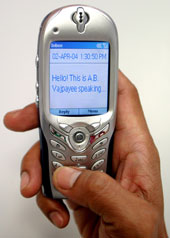 |
| HARD CELL: Not your personal space any longer |
In the past few weeks, thousands across India have received an identical phone call. It begins with a polite and polished voice saying, “Namaskar, main Atal Bihari Vajpayee bol raha hoon.” For the next minute or so, the Prime Minister first eulogises the virtues and achievements of the present Union government and then tells you how a lot more remains to be done. “Dhanyavad,” the dissemination ends.
This is just one instance of many kinds of unsolicited calls or SMS messages that thousands of mobile phone users receive every day. Be it a crucial company meeting, a dream dinner date or an urgent hospital visit, there is no respite from these calls or messages. Making unwarranted interventions, these callers strive to sell you an insurance policy or a credit card. And, these messages offer holiday packages, or, simply ask for your political support; thereby invading an individual’s privacy in every possible way.
Even when travelling from one state to another, a user is bombarded with similar short electronic texts. “It’s alright if such messages are sent only for information’s sake. But often they are also loaded with commercial elements,” says top cyber lawyer Pavan Duggal.
Senior supreme court lawyer Rajeev Dhavan believes that such calls are a gross invasion of privacy. “The cellphone is a facility for communication by consent. It is not an invitation to either commercial people or political parties.”
But nothing seems to be stopping private companies and political parties who simply cannot resist the lure of directly communicating with their target audience. More so, when the number of mobile phone users is rising dramatically every year. According to Telephone Regulatory Authority of India, in February, 2004, India had 31.67 million mobile phone users compared to 12.87 million a year ago; a whopping increase of about 19 million users.
Direct marketing firms believe that getting campaigns through an SMS message or a phone call ensures reach to a certain quality of audience. After all, a mobile phone user is expected to have a minimum capability to purchase goods and services. Consequently, companies are finding it extremely profitable to target mobile users. “The mobile phone has opened up a new promotional avenue for many companies, both small and big,” says the owner of a Delhi-based small direct marketing firm. Privacy? The concept seems to be alien to him. “In a country where millions still live in single-room homes, I don’t understand how a telephone call can invade your privacy. Actually, we are only trying to make things easier for the consumer,” he says.
The companies and the political parties are emboldened by the fact that India doesn’t have a comprehensive legislation on privacy. It has been left to the judiciary to interpret privacy within the sphere of existing legislations. Privacy is guaranteed but only against state action. “There is no law which protects individuals against private actions. There are no effective remedies available barring trying to claim some damages and trying to get an injunction,” says Duggal.
The SMS, which is an abbreviated form of short messaging service, is an electronic message. It comes under the ambit of electronic format messaging under the Indian law. Until recently, it was generally believed that spam is the practice of sending unsolicited e-mails, ranging from commercial to junk, to others. However, unsolicited phone calls or SMS, also fall in the category of spams.
Such spams are of two types — those with commercial considerations and those with politico-commercial agenda. The commercial spam has been around for about a year or more. But the politico-commercial spam is relatively new. During the Delhi State Assembly elections last December, many mobile phone users got a taste of this phenomenon when they received SMS requesting them to cast their ballot favouring Congress leader Sheila Dixit.
Interestingly, the Indian law doesn’t make a difference between a voice and a text message. Both of them are considered electronic messages. “The Information Technology Act, 2000 does not distinguish between a mobile message or an electronic message. The mobile phone, as per the law, is like an computer. Anything and everything which has a memory function is also a computer within the meaning of the law,” says Duggal. In fact, India’s first cyberlaw leaves out the vital issue of privacy. The Act does not define privacy, but only refers to it once.
Without a proper law to check them, telephone spams are fast becoming a social menace. How to tackle them is a matter torn between two different schools of thought. The first talks about the right to privacy of individuals. “Such large-scale invasion is inimical to the freedom and privacy of people and should be stopped at once,” says Dhavan.
The second school of thought feels the need to also look into the legitimate business rights of the direct marketing industry. “The law needs to have a balance between both these sides,” feels Duggal.
The Delhi-based cyber lawyer also feels that the law needs to define fast what kind of spam is permissible and what is not. “One has to find out what is an acceptable commercial message and what is an unwarranted commercial message,” he says.
But, right now, any solution seems a long distance away. Till then, hapless consumers have no option but to rush from the bathroom only to find the Prime Minister peddling his wares. Or, look at an SMS message after India beats Pakistan in cricket from people who identify themselves only as ‘We Indians’, saying, “Sourav, Sachin aur Atal Bihari, khelenge aur lambi pari.” Or, listen to an insistent young lady on the other line offering you a new connection.

